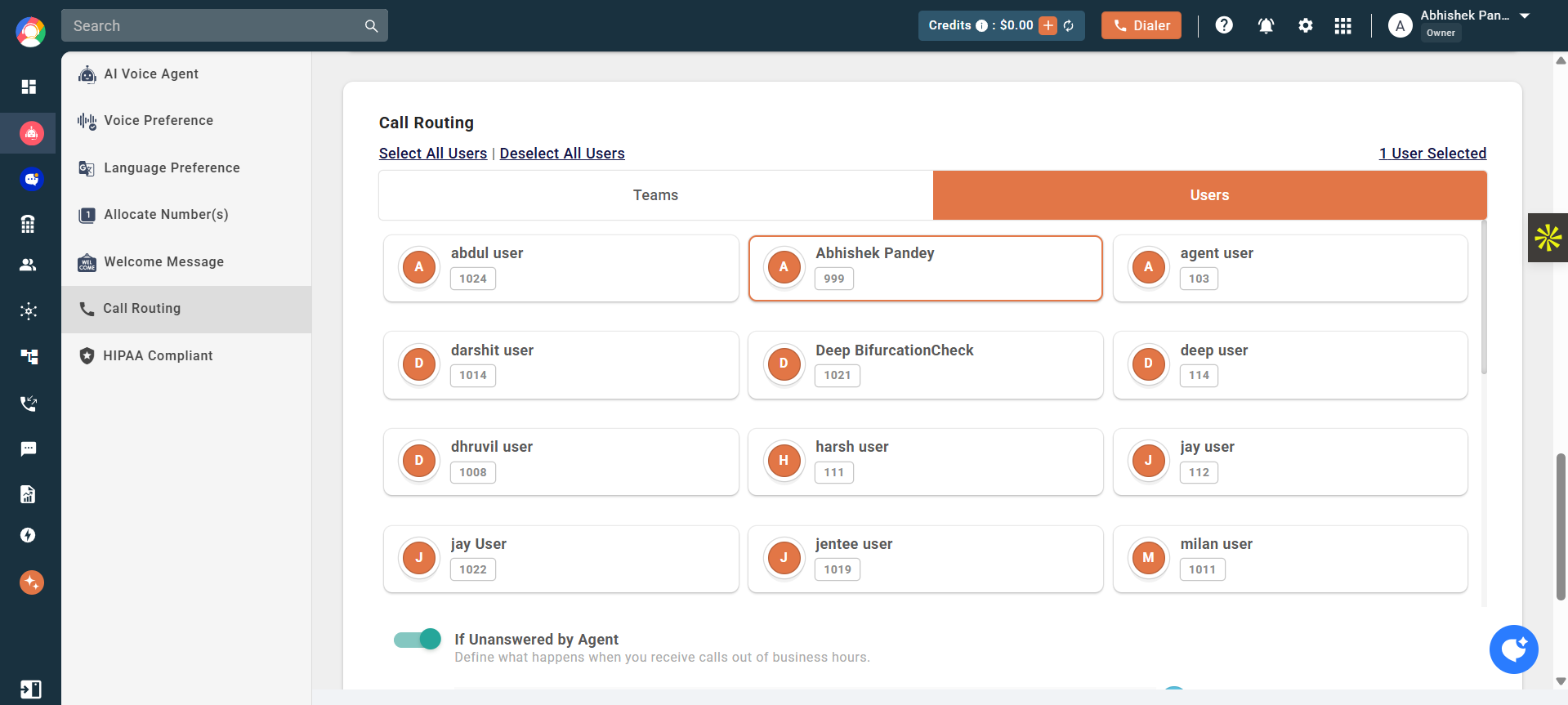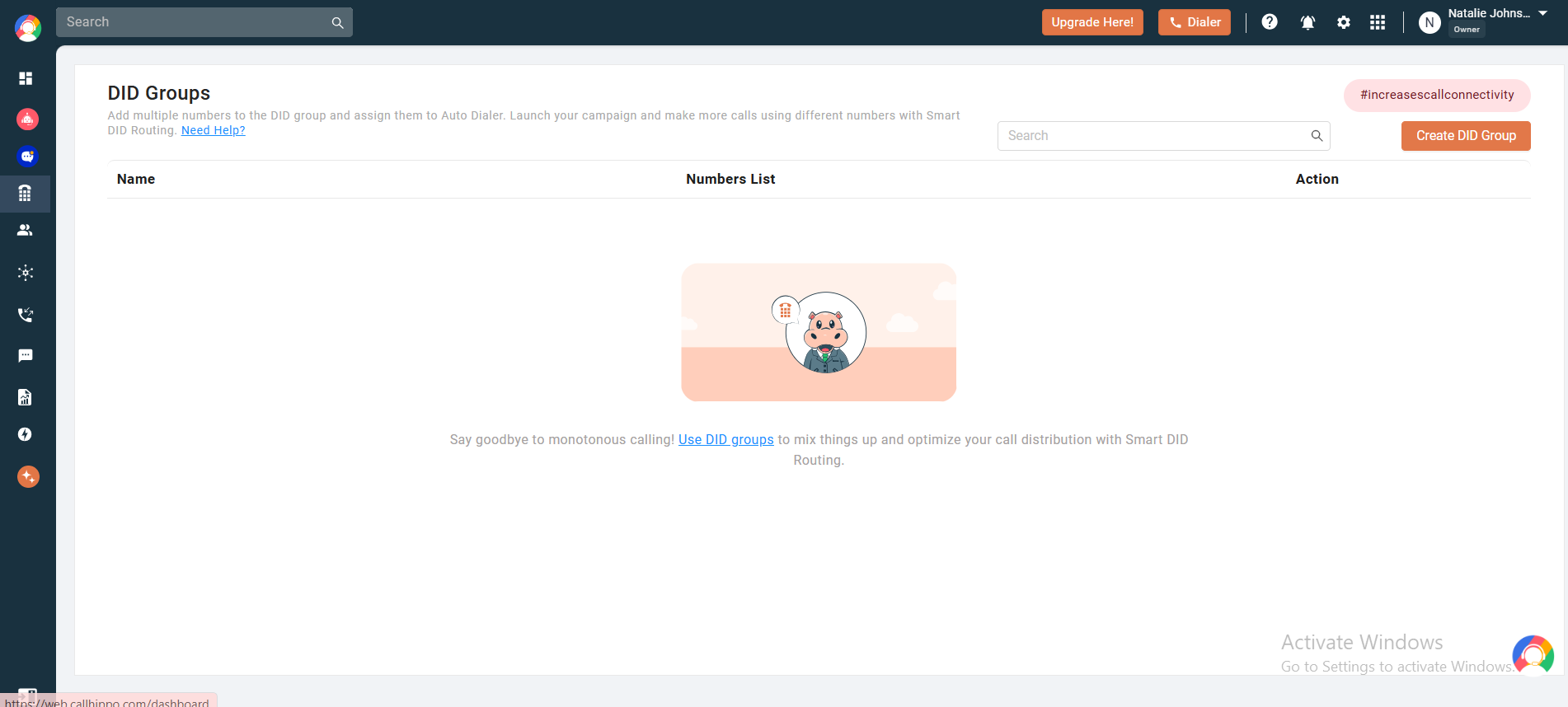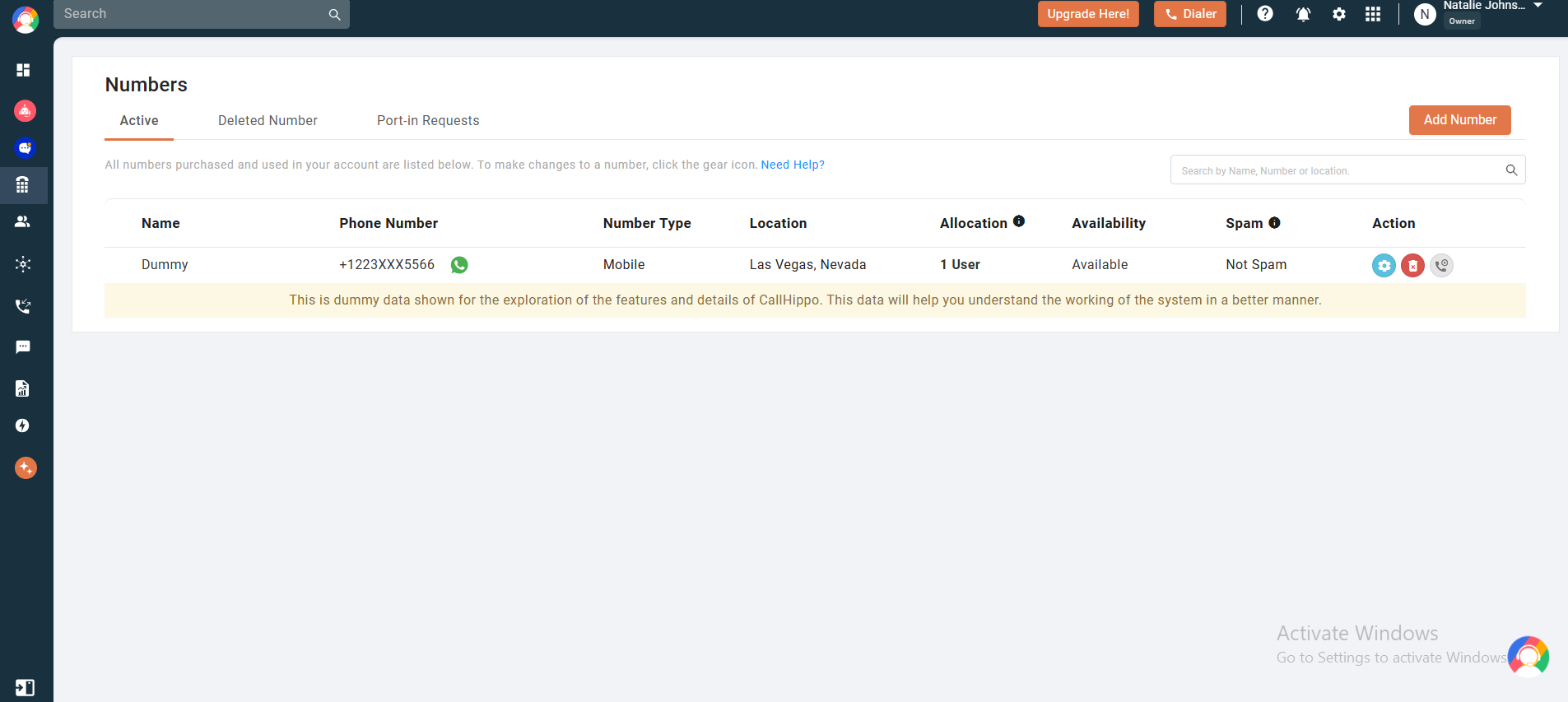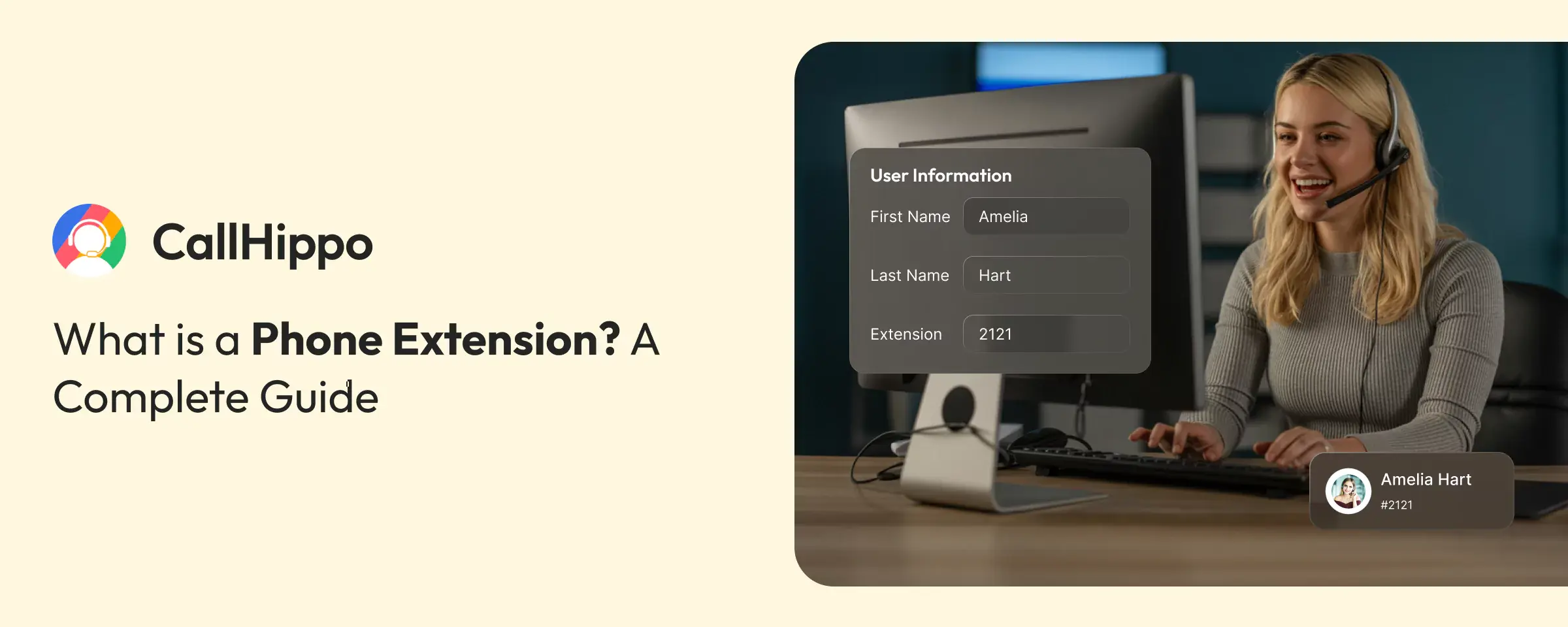Running a business means handling endless calls. But what if customers keep getting transferred and leave frustrated? That’s a real risk. Phone extensions are the answer; they route calls faster, improve experiences, and help your team stay efficient. This saves you time, makes communication smoother, and helps your business handle incoming calls more efficiently. 67% of customers are frustrated when transferred between multiple agents. In this guide, we’ll explain what phone extensions are, how phone extensions work, and why they’re useful for both your small business and large companies.
What Does Phone Extension Mean?
A phone extension is a short internal number within a business phone system that helps employees connect quickly without dialing full phone numbers. Usually appended to a main business line, extensions allow callers to reach specific departments or team members directly.
How Does a Phone Extension Work?
Phone extensions work by routing incoming calls from your company’s main business number to the right person or department. This makes communication faster and avoids unnecessary call transfers.
- Phone number extensions route calls directly to the right department or person, saving you time.
- Your callers dial the business number, then use extension dialing to connect with their contact.
- Extensions reduce unnecessary transfers. They improve communication speed and make your customer experience better.
Benefits of Using Phone Extensions
Phone extensions offer your business a simple way to improve communication and manage incoming calls better. They save time for your employees and create a better caller experience. They also help your company reduce costs and support remote teamwork.
Easy Internal Communication
Your employees can connect right away using short extensions. This saves time and avoids delays. It leads to faster teamwork between your team members and better workplace productivity.
Cost Savings for Businesses
Your business can reduce costs by using only one line with multiple extensions. This removes the need for multiple phone lines. You keep smooth and good internal calls.
Professional Call Routing
Phone extensions make sure your incoming calls ring to the correct person or department. This creates a professional, smooth experience. It builds trust and satisfaction for your customers.
Flexibility for Remote Teams
Your remote employees can use extensions to stay connected with their teams. This helps good teamwork and smooth communication from any physical location. No interruptions happen.
Ready to scale communication?
Get CallHippo Extensions and empower your business today
Types of Phone Extensions
Phone number extensions come in different types. These include traditional landline, VoIP-based, and virtual extensions. Each offers unique communication advantages for your business.
Traditional Landline Extensions
Traditional landline extensions connect to a physical PBX system installed in the same office. They allow your employees to transfer calls internally using wired phone lines. While dependable for local communication, these systems are less flexible. They’re harder to scale and more expensive to maintain compared to modern VoIP systems or virtual phone extension solutions.
VoIP Phone Extensions
VoIP extensions work using the internet instead of traditional business lines. They help your business manage calls better and reduce communication costs. They give you advanced features like call forwarding, voicemail, and connections with business tools. VoIP phone systems are very flexible.
Virtual Phone Extensions
Virtual extensions don’t need physical hardware or fixed office setups. Instead, they forward calls from your main business number to mobile phones or computers. This allows your remote employees and small businesses to stay connected easily. Virtual numbers are easy to grow, cost-effective, and good for modern communication needs.
Home vs. Business Extensions
Home and business phone extensions differ in purpose, features, and usage, offering unique advantages depending on personal or organizational communication needs.
| Feature | Home Phone Extensions | Business Phone Extensions |
|---|---|---|
| Purpose | Used mainly for personal or family communication within a household. | Designed for professional communication across departments, teams, and employees. |
| Complexity | Simple to configure, requiring minimal technical knowledge or equipment. | More complex, often integrated with PBX or VoIP systems for advanced call handling. |
| Scalability | Limited to a few lines, not suitable for large setups. | Highly scalable, supporting multiple lines and unlimited extensions. |
| Features | Basic call transfer or forwarding with limited capabilities. | Advanced features like voicemail, auto attendant, IVR, call routing, and call recording. |
| Cost | Low cost, usually tied to a home landline or cell phone plan. | Higher cost, but optimized with VoIP for efficiency in larger businesses. |
| Flexibility | Limited flexibility, generally confined to one location. | High flexibility, supports remote teams and global communication seamlessly. |
Virtual Numbers vs. Extensions
Virtual phone numbers and extensions both simplify communication but serve different purposes. Virtual numbers provide unique phone lines, while extensions route calls within an existing business phone system.
| Feature | Virtual Numbers | Extensions |
|---|---|---|
| Definition | Independent phone numbers not tied to a physical line or location. | Short internal numbers linked to a main business phone number. |
| Purpose | Create a local or international presence, useful for customer-facing operations with ring groups functionality. | Direct external calls internally to specific employees, teams, or departments using simultaneous ring features. |
| Setup | Requires VoIP phone system or provider setup, no hardware needed for flexible configurations. | Works under a PBX or VoIP system, requires your main number to assign extensions to team members. |
| Flexibility | Highly flexible, can forward calls to mobile devices or remote offices across multiple locations. | Flexible for routing calls internally, but depends on business phone infrastructure and call center setup. |
| Features | Caller ID masking, call forwarding, SMS support, and local area code numbers. | Transfer calls, voicemail, auto attendant, and efficient routing to the correct extension. |
| Cost | May include monthly subscription or per-number charges. | Generally cost-effective as part of a phone system with shared resources. |
| Best For | Businesses expanding globally or building a local presence. | Organizations managing internal communication and streamlining customer interactions. |
Phone Extensions vs Direct Phone Numbers
Phone number extensions and direct phone numbers differ in how calls are managed. Extensions route calls internally, while direct numbers connect external callers straight to one individual or line.
| Feature | Phone Extensions | Direct Phone Numbers |
|---|---|---|
| Definition | Short internal codes linked to a company's main business number. | Unique, standalone phone numbers assigned directly to one person or department. |
| Purpose | Simplify internal communication and call routing within a business phone system. | Allow customers or clients to reach someone directly without navigating extensions. |
| Setup | Requires PBX or VoIP system under a main number. | Simple setup, requires assigning a dedicated phone line or VoIP number. |
| Flexibility | Best for large teams sharing one main number. | Ideal for individuals or small teams needing a dedicated line. |
| Features | Transfer calls, voicemail, IVR, auto attendant, and routing options. | Caller ID, voicemail, call forwarding, and mobile accessibility. |
| Cost | Cost-effective as part of a business phone system. | May be more expensive since each line requires its own number. |
| Best For | Companies with multiple departments, employees, or large call volumes. | Freelancers, small businesses, or roles requiring direct customer accessibility. |
What Are the Key Features of Phone Extensions?
Phone extensions provide call routing, transfers, voicemail, and conferencing. They improve communication, boost efficiency, and offer scalable, cost-effective solutions for your business.
IVR
Interactive voice response (IVR) allows your callers to navigate through menus using keypad inputs or voice commands. It helps your business route calls automatically. This saves time and improves caller satisfaction.
Call Routing
Call routing makes sure your incoming calls are directed to the right department or person. This reduces delays and avoids wrong connections. It makes sure every caller reaches the correct extension without unnecessary transfers.

Direct Inward Dialing
Direct Inward Dialing (DID) gives you unique direct numbers within your system. Your callers can skip menus and reach specific extensions directly. This makes access quick and improves overall communication.

Call Forwarding
Call forwarding automatically sends your calls to another number when unavailable. Your employees can stay connected even outside the office. This makes sure communication continues and no calls are missed, regardless of location or time.
Call Transfer
Call transfer allows your employees to move an ongoing call to another extension. It makes sure callers reach the right person quickly. This avoids hold times and improves call flow inside your organization.
Call Queuing
Call queuing places callers in a virtual line when all the devices are busy. It gives estimated wait times and reduces call abandonment. This makes sure every caller gets help without frustration.

Call Flip
Call flip lets your employees move ongoing calls between multiple devices, like desk phones and mobiles, without interruption. It supports flexibility and mobility. It gives consistent caller experiences across different devices.
Voicemail
Voicemail allows callers to leave recorded messages when the recipient is unavailable. It makes sure important communication is never missed. It gives your employees an easy way to follow up later.
Common Use Cases of Phone Extensions
Phone extensions are widely used across industries. They simplify communication, improve your customer experience, and enhance team collaboration efficiently.
Customer Support Teams
Phone number extensions help your customer support teams handle calls better by routing customers to the correct agent. This reduces wait times and improves how fast issues get solved. It creates smoother communication. Your technical support agents can focus on solving problems instead of managing call transfers. This results in better customer satisfaction across industries.
- A retail company assigns extensions for order tracking, warranty queries, and product support. This makes sure customers connect right away with specialized teams.
Specific Departments
Extensions allow direct access to departments such as billing, HR, or sales department without unnecessary transfers. This makes communication simpler and saves time. It reduces frustration for customers and employees alike. Your company benefits from more accurate connections. Callers enjoy better support experiences. This leads to better service delivery across your organization.
- A hospital uses extensions to route patients directly to cardiology, emergency, or billing departments. This reduces receptionist workload and caller confusion.
Remote and Hybrid Teams
Phone extensions keep your remote and hybrid employees connected under one unified business system. Your incoming calls ring to mobile phones or laptops. This allows your employees to remain professional and accessible. It strengthens teamwork across teams and removes location barriers. It ensures consistent business communication even when your employees work from different regions.
- A software company connects developers globally through extensions. This helps good communication without revealing personal numbers. It supports both productivity and privacy.
Facilitates Self Service (IVR Integrations)
When combined with interactive voice response, extensions give your customers the ability to navigate menus themselves. They can reach desired services without waiting for an agent. This reduces workload on your support teams and improves how things work. It gives customers more control. Your organization benefits from better operations and more satisfied customers enjoying faster, more convenient service.
- A bank integrates IVR with extensions so customers can access credit card services, loan information, or branch support without agent help.
How to Choose the Right Phone Extension System for Your Business?
Choosing the right phone extension system requires analyzing your business needs, budget, scalability, security, integrations, and vendor support. This ensures seamless communication and sustainable long-term growth.
Assessing Your Team Size and Growth Plans
Consider your current team size and future expansion goals. Your system should easily handle new users without disruptions. Choosing a flexible solution helps with long-term growth. It helps your business handle growth smoothly. You keep good communication and productivity across teams.
Evaluating Budget and Long-Term Costs
Look at not just upfront costs but ongoing expenses. These include subscriptions, maintenance, and upgrades. A budget-friendly yet reliable system prevents financial strain while offering advanced features. Long-term affordability makes sure your business gets strong communication capabilities without overspending. You balance costs well with performance needs.
Comparing Landline, VoIP, and Virtual Extensions
Traditional landlines offer stability. VoIP extensions and virtual extensions give flexibility and cost savings. Compare features, scalability, and accessibility carefully. Choosing the right type makes sure your business has reliable communication. It fits with modern needs, employee preferences, and customer expectations.
- Business extensions were originally available only with expensive corporate PBX installations.
Integration Needs with CRM and Business Tools
Extensions that work with CRM and tools help unify workflows. They centralize data and improve how things work. This makes sure customer details are always accessible during your calls. A well-integrated system improves productivity and makes processes smoother. It helps your teams deliver personalized, consistent, and good service experiences every time.
Scalability and Remote Work Support
Choose a system that grows with your business and supports remote operations. Cloud-based extensions allow your teams to connect easily from anywhere. Scalability helps smooth the onboarding of employees. Remote-friendly features keep teamwork, good workflow, and consistent communication in flexible, hybrid, or fully remote environments.
Security and Compliance Requirements
Your phone extensions must focus on data security and regulatory compliance. Features like encryption, access controls, and audit trails keep sensitive information safe. Compliance makes sure your business avoids legal risks. It builds trust with customers and keeps professional credibility across all communication channels and operational processes.
Vendor Reliability and Customer Support
Selecting a trusted vendor helps with reliability, smooth service, and continuous support. Strong customer service helps solve issues quickly. A reliable provider guarantees uptime, feature updates, and guidance. This makes your communication system sustainable, scalable, and good for long-term success without unnecessary disruptions or downtime.
Challenges and Limitations of Phone Extensions
Phone extensions streamline communication, but your business faces certain challenges and limitations. These can impact efficiency, scalability, and customer experience.
Caller Confusion with Extensions
- Callers may forget or dial the wrong extension, which leads to delays, frustration, and misdirected calls.
- Keep extensions short and easy to remember so callers don’t struggle. Add an automated voice menu to guide them step by step. This helps customers connect with the right person quickly and reduces wasted time.
Technical Setup Issues
- Setting up extensions can feel complicated, especially with traditional phone systems or VoIP tools. Mistakes during setup may disrupt communication.
- Pick a provider that offers simple setup instructions anyone can follow. Look for providers with strong customer support to answer questions when problems arise. This makes the whole process smooth and less stressful for your team.
Scalability Challenges for Large Teams
- As businesses grow, managing a large number of extensions becomes confusing and time-consuming.
- Choose a phone system that lets you add or remove extensions in minutes. This keeps your setup flexible as your team expands or changes. It also saves time for managers while ensuring communication stays organized.
Future of Phone Extensions in Business Communication
Phone extensions are turning out to be something much broader than mere call-routing tools. Given the advent of cloud telephony, companies appropriately merge extensions into unified platforms, drawing a direct gaze on making internal communication easy and expediting customer connections. Such flexibility keeps a company well-suited to modern communication needs, completely independent of any hardware-based system.
The VoIP market is projected to exceed USD 102 billion by 2030. The future emphasis is on smarter phone extensions that deploy AI. The call routing, analytics, and integrations will increase productivity, cut down response time, and create real-time customer experiences. As remote working expands worldwide, putting global teams to use virtually will smooth out communications while keeping costs down and making these services scalable for companies of all sizes.
Conclusion
Phone extensions continue to play a vital role in modern business communication by simplifying internal collaboration, enhancing customer experience, and supporting remote work. From traditional landlines to VoIP phone systems and virtual extensions, businesses have options that match their size, budget, and future growth needs.
While challenges like caller confusion, setup complexity, and scalability issues exist, these can be managed through clear instructions, advanced technology, and vendor support. Looking ahead, cloud-based, AI-powered, and integration-friendly extension systems will shape the future, offering organizations secure, flexible, and cost-efficient communication solutions for long-term success.
FAQs
1. Can I use a phone extension on my mobile?
Yes, you can utilize the phone extension on your mobile with Vo-IP services such as CallHippo. The extension connects through the internet. Hence, it lets one receive calls at any place. The method ensures uninterrupted communication unaffected by rigid desk phone connections. This creates flexibility for a remote team as well as traveling employees.
2. Do all businesses use phone extensions?
Not all businesses use phone extensions, but many rely on them for efficient call management. Small teams may function with direct numbers, while larger organizations prefer multiple extensions. With CallHippo, even startups can access affordable virtual extensions. This ensures professional communication systems that scale easily as your company grows and requirements expand.
3. How do I set up a VoIP phone extension?
To set up a VoIP phone extension, choose a provider like CallHippo. You assign extensions to your employees and configure extensions through their system. The process is simple and requires no complex hardware. You can modify extensions from an online dashboard. This offers your business flexibility, scalability, and better communication efficiency across multiple teams or departments.
4. What’s the difference between a phone number and a phone extension?
A phone number connects directly to one specific line, while extension phone numbers work under your main business number. Extensions route callers internally to your sales manager or the right person. CallHippo provides both options. This ensures your business maintains flexibility, professional communication, and the ability to scale effortlessly based on unique organizational needs.

Subscribe to our newsletter & never miss our latest news and promotions.








